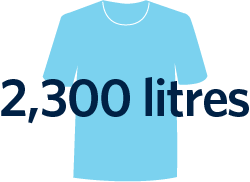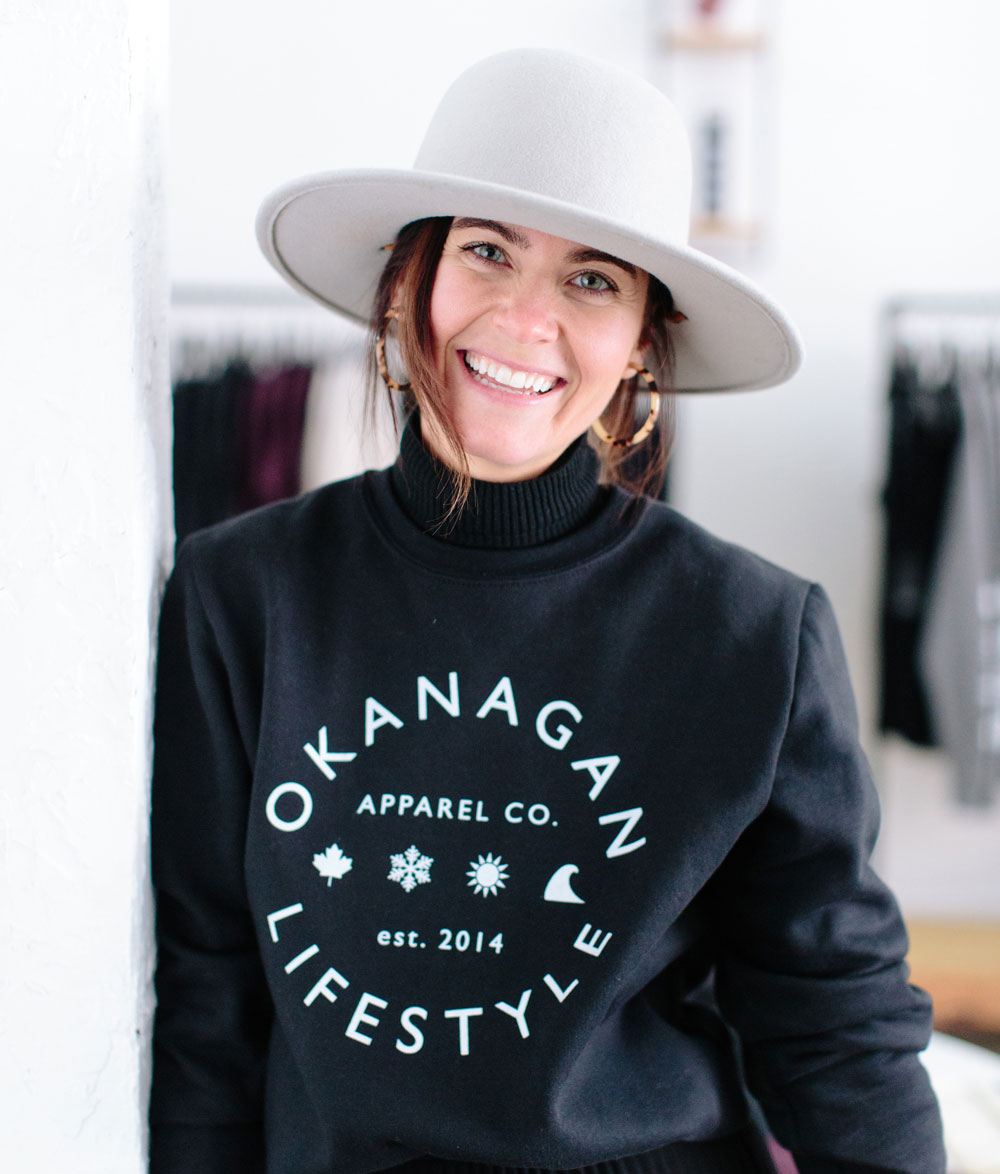
GLOBALLY, THE FASHION INDUSTRY IS VALUED AT AN ASTRONOMICAL $3-trillion and only continues to grow—the product of rising consumerism, increased buying power and the advent of accessibility through online shopping.
But an ugly byproduct of the industry is the incredible amount of waste it creates. According to the Recycling Council of Ontario, North Americans send around 10 million tonnes of textiles to the landfill annually. Given that most textiles take over 200 years to decompose and 95 per cent of them can be reused or recycled, it’s no surprise that consumers and merchants alike are starting to pursue more sustainable fashion practices.
This means doing more than just using natural or recycled fabrics, explains Ariele Parker, a master’s student in UBC Okanagan’s Interdisciplinary Graduate Studies program. “There are lots of branches of sustainability that not everyone thinks about, from designing and manufacturing to distribution and wear. To make fashion more sustainable, companies need to look at all the stages of how clothing is created and produced. At the same time, consumers need to consider buying less often and wearing things longer in order to be more environmentally friendly.”
As part of her master’s thesis, Parker—alongside supervisor Dr. Eric Li from the Faculty of Management—worked with local fashion brand Okanagan Lifestyle Apparel (OKGN) to focus on sustainability. Their initial goal was to be kinder to the environment while creating a stronger sense of community around the brand. Their work so far has demonstrated that it’s economically possible to be sustainable, even during a global pandemic.
Fashion by the Numbers

The average amount of water needed to produce a typical
t-shirt

The fashion industry is the third-highest polluting industry in the world

The average distance travelled by a t-shirt before arriving at the final consumer
For Jaclyn Robertson, OKGN’s founder and a proud UBC Okanagan alumna, her company was founded as a vehicle to build positive change within the community.
Robertson notes that collaborations like the one with UBCO are key to achieving OKGN’s sustainability goals while also creating a positive impact in the community. “I’m passionate about working with key partners whose ethics and values align tightly so we can make this world a better place. That starts with finding solutions to areas needing improvement in our own backyard.”

UBCO alumna and OKGN Lifestyle founder Jaclyn Robertson. Photo courtesy of Jon Adrian.
For Parker, Dr. Li and Robertson, that meant getting back to basics at OKGN Lifestyle. “During the height of the COVID-19 pandemic, there was a lot of critical and important information to navigate and shift through. I appreciated that our decisions as a brand were well informed and research-based, thanks to our partnership with UBCO,” Robertson notes.
Those decisions included transitioning to low-environmental-impact textiles, using dyes that are less toxic to the environment and designing pieces more neutral in colour. As a result, each piece not only lasts longer—in terms of outliving trends and in general quality—but their production has fewer negative impacts on waterways.
To deal with the effect of clothes and textiles in landfills, OKGN expanded its thrifting program, in which previously-owned clothes are embroidered with custom Okanagan Lifestyle designs to create new products, effectively keeping clothes out of the landfill and creating a circular economy. The brand’s sustainability work even extends to construction; when they expanded their storefront, only recycled materials from pre-existing job sites were used.
But perhaps OKGN’s biggest change came as a result of examining its carbon emissions. “Together we reconsidered OKGN’s supply chain,” explains Parker. “Now 90 per cent of the product line is made in Canada, and each product travels far less by road or air. That’s quite a large shift for an organization, especially during a pandemic.”
Two Passions in Sustainability Meet
After spending several years working in the marketing field—including with some local non-profits in the Kelowna area—Parker decided to return to school for her master’s degree, focusing on sustainability and fashion. Before she was accepted into the program she launched a tea social enterprise that connected her with UBCO’s Healthy Living Project, in which management students work with various non-profits on a personalized marketing plan. It was here where Parker was able to connect with Dr. Li and better understand his research, and how it aligned with her own beliefs on sustainability.
Parker’s work with OKGN was funded through Mitacs Accelerate, in which students work on a research challenge proposed by an industry or community partner. Working and studying this way is ultimately keeping Parker on track. “It’s a nice way of keeping organized and putting into action what I’m studying,” she says.
Parker adds that she’s grateful she has been able to work with Dr. Li: “He is well-known and recognized for his work in the non-profit and social enterprise sector,” she says. “He’s also well-respected as a supervisor and professor, and promotes a sense of work-life balance, which is important for me.”
Dr. Li says that although the COVID-19 pandemic has allowed people to rethink their “new norm,” he hopes that research-intensive universities like UBCO will continue building a healthy and sustainable research network with community partners. “We learned a lot from this Mitacs partnership. We’re thankful to have the OKGN team supporting our research on sustainable fashion during this unprecedented time.”
Over the past several years, Dr. Li’s research program has focused on community and stakeholder engagement and social innovation, as well as reconsidering market systems in new ways. In his work with the Central Okanagan Community Food Bank and the Helen’s Acres Community Farm, Dr. Li focuses on sustainability from the perspectives of donation management and food waste reduction.
“I’m so passionate about helping local enterprises, especially those small-to-medium businesses, find their way and become more sustainable,” explains Dr. Li, UBCO’s 2021 Researcher of the Year and a Principal’s Research Chair in Social Innovation for Health Equity and Food Security. “I believe that the Okanagan is an emerging region in terms of how we’re creating sustainability at the local level, and this will impact the whole community. All the businesses I’m working with are an active part of that.”
He adds: “At the end of the day, it’s not just thinking about your own company, but also how to create a more sustainable ecosystem that empowers people in the region.”
COVID-19 Causes an Unexpected Twist
Across the globe, the COVID-19 pandemic has not only changed the face of retail—effectively moving it from bricks and mortar shops to online—but consumers have evolved as well. A 2020 global survey from Accenture found that consumers are becoming more environmentally conscious, with 60 per cent of respondents making more environmentally friendly, sustainable or ethical purchases since the start of the pandemic. Nine out of 10 of that percentage said they were likely to continue their new habits.
“There wasn’t one single area of the business that wasn’t impacted by COVID-19. It forced the world to think about health, safety, connection and sustainability at a depth that many are not accustomed to,” says Robertson. “We specifically found through the pandemic that fashion became more casual. People were buying less and looking for quality goods they could wear more often. So we responded to that by focusing on quality basic pieces that last longer and are easier on the environment.”

Ariele Parker and Dr. Eric Li.
While OKGN’s organic online presence and shopping platform were already well-established prior to the pandemic, the importance of supporting local initiatives and small businesses—especially after full lockdowns—was critical during the pandemic. Dr. Li and Parker were able to provide important research for how to pivot during inventory shortages and predict future concerns that may arise—including the likelihood of coping with the pandemic for the long haul.
“We made decisions for a year, knowing we were playing the long-game,” explains Dr. Li. “On the consumer side, we also encouraged community-based purchases to support the local economy. This builds positive economic growth in the community and increases education and access to sustainably produced goods.”
This strategy has in turn helped OKGN grow more than 300 per cent year-over-year since the pandemic started.
For both Parker and Dr. Li, the results of their research work have shown them that ‘the sky’s the limit’ when it comes to community partnerships.
“We’re seeing that local organizations are excited to collaborate with one another and with the university to build genuine relationships. It’s a great way to support students’ experiential learning while also illustrating the health of the local business community.”